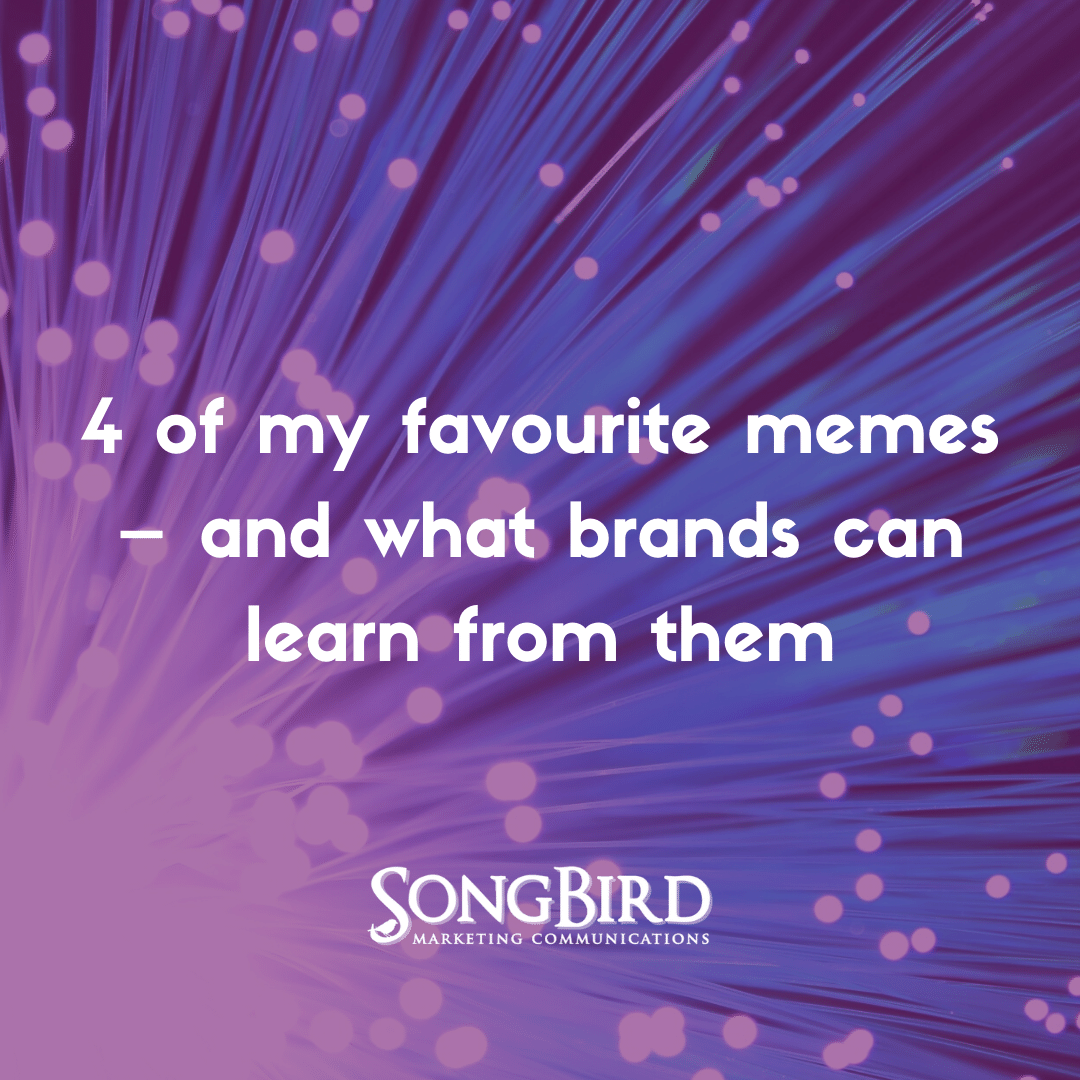4 of my favourite memes – and what brands can learn from them
By Candace Huntly
According to Merriam-Webster Dictionary, a meme (pronounced “meem”) is “an idea, behavior, style, or usage that spreads from person to person within a culture.” It can also be defined as “an amusing or interesting item (such as a captioned picture or video) or genre of items that is spread widely online especially through social media.” Memes have become an integral part of internet culture, but they have also been around since long before the internet was even a thing. There are so many of them already out there and so many that are created on a daily basis, it’s hard to say how many have actually been created.
Although memes have exploded in popularity in the last decade, the term isn’t new. It was coined by Richard Dawkins in 1976 when he used and then abbreviated the Greek word “mimeme” in his book The Selfish Gene to describe the idea of ideas being passed down through generations and cultures.
Used in the right way, brands can definitely jump on the meme bandwagon by tapping into trending memes as a way to connect with target audiences. There is also a lot we can learn about how to market to audiences from popular memes over the years.
Here are a few of my favourite memes.
CHEESING (2018/2019)
[embed]https://twitter.com/annaclairerusso/status/1101319942794821632[/embed]It’s harmless (well, not everyone thought it was) and funny. It started with dogs and then progressed to babies. People thought it was funny to throw slices of cheese onto babies and dogs. When you say it out loud, it really doesn’t make sense why it took off – it actually seems really silly. But it did. It went viral and for a time the internet was flooded with videos of confused dogs and babies with cheese on their faces.
WHY IT WORKS
Parenting is difficult enough as it is and you have to find ways to laugh. It could be as simple as throwing a piece of cheese on your kid’s face or stacking cheerios on a sleeping baby, regardless, this shows brands that they shouldn’t take everything so seriously. Find ways to laugh at yourself and have fun with your marketing. Your customers will respond better.
BABY YODA (2019)
When Disney’s The Mandalorian came out, I wonder whether they knew that Baby Yoda would become such a cultural phenomenon. With only a partial back story (and plenty of speculation from die-hard fans), Baby Yoda sparked an entire series of memes – from drinking bone broth to riding in his pod cradle, take your pick. There is likely a Baby Yoda meme for whatever you are looking to get across.
WHY IT WORKS
The world loves cute creatures. From goats in pajamas, to cats, puppies, and everything in between, if you can get your message across with a cute visual, it just works. For some reason it gets people to stop scrolling. It could be that we’re all just desperate for something positive in a world with so much bad news, but regardless, cute just works.
OK BOOMER (2019)
While “ok boomer” was popular in 2019, it is still hanging around in 2020. You hear it used every-so-often – sometimes to retorts that “that is so 2019.” It was used as a clapback from Gen Z and Millennials when they felt that older generations were completely out of touch with the realities faced by younger generations. While many were really rubbed the wrong way by the phrase (including some that said it was hate speech), “ok boomer” demonstrated that an entire generation could come together in non-violent, sarcastic harmony. Once mainstream news outlets picked it up it kind of started dying after that.
WHY IT WORKS
Whole generations have challenges and when they all band together, you get reactions like “ok boomer.” As a brand, you need to figure out what matters most to your target audience and tap into it.
CONDESCENDING WONKA MEME (2011)
While the original Charlie and the Chocolate Factory film came out in 1971, Gene Wilder’s portrayal of Willy Wonka clearly had pop culture staying power. The condescending Wonka meme rose to popularity in 2011 and is still used to this day almost a decade later. This meme is dripping in sarcasm and insulting humour. With phrases like “You must be new here” the options are endless.
WHY IT WORKS
A little sarcasm goes a long way. Sarcasm doesn’t always fit within a brand’s personality and messaging, but if you can make it work, play around with it!
What are some of your favourite memes? Have you ever used memes in your marketing? Tell us in the comments below!



